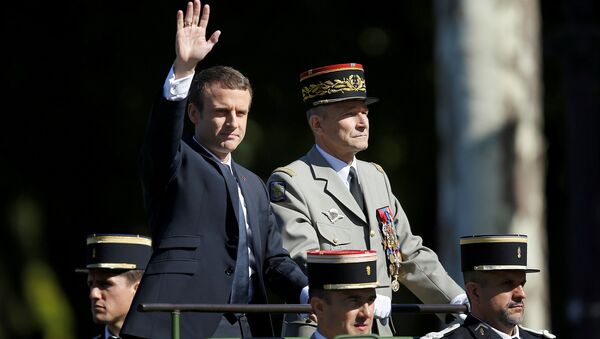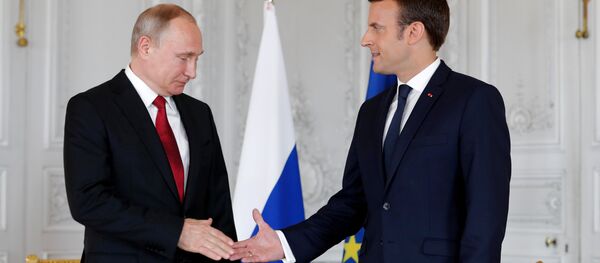Speaking to reporters Wednesday, French President Emmanuel Macron remarked that the Iran nuclear deal was "not enough" in light of Tehran's growing influence in the region and its missile program.
Does it mean Paris is leaning toward Washington and Tel Aviv who are seeking to isolate Iran? Quite the contrary, Milad Jokar, an expert on Iranian affairs and fellow at the Institute for European Prospective and Security (IPSE), told Sputnik France.
"France has not changed its position… Paris still wants to stay within the framework of existing agreements," Jokar underscored, referring to the Iran nuclear accords adopted by the P5+1 (China, France, Germany, Russia, the United Kingdom, and the United States), the European Union (EU), and Iran in October 2015.
According to the scholar, it is the US who risks being sidelined in case it withdraws from the nuclear deal also known as the Joint Comprehensive Plan of Action (JCPOA).
"Today the 'nuclear deal' has the status of 'UN agreements'," Jokar pointed out. "If anyone is in isolation [over the deal], it's [US President Donald] Trump."
Previously, the US president had repeatedly dropped the hint that Washington could unilaterally exit the agreement.
Jokar surmised that Trump is trying to manipulate Tehran into making a mistake. However, the Iranian leadership is too smart to fall into his trap.
The scholar explained that for his part, Macron is proposing a new approach to Mideast affairs: the region needs to be stabilized through close collaboration of all parties concerned, most notably, Tehran.
"Excluding Iran [from the process] means abandoning the hope that bridges will be built between various states," Jokar emphasized, adding that the Middle East remains of ultimate importance to Europe given existing trade links with the region, migration and security issues.
He highlighted that France's vision differs from that of the United States: Paris is returning to the Middle Eastern region and investing millions in Iran.
"Macron has much in common with Mohammad-Javad Zarif, who says that in the global world, security for some cannot be built at the expense of security for the others," he noted.
"Renouncing it would be a grave error, not respecting it would be irresponsible, because it is a good accord that is essential to peace at a time where the risk of an infernal conflagration cannot be excluded," Macron said.
Macron's remark came as a response to Trump's fierce criticism of JCPOA.
The French president also addressed the Syrian issue claiming that "[the Astana process] may today be useful but it is not adequate." He proposed forming a new "contact group" in order to bring an end to the six-year war.
At the same time, however, in his interview with CNN later that day Macron clarified that the Syrian conflict could not been solved without Russia.
"It's impossible to fix the Syrian situation without Russia… I think on Syria, we can act together," the French president underscored.
A series of Astana negotiations on the Syrian crisis were kicked off by Russia, Turkey and Iran in December 2016 in Kazakhstan's capital. The Astana format has become one of the major global platforms for negotiations on the settlement of the conflict.
Thus, the landmark agreement on establishment of de-escalation zones in the war-torn country was reached in the Kazakh capital. The latest round of the intra-Syrian talks in Astana was held on September 14-15.
Commenting on Macron's statement on Mideast affairs Thomas Flichy de La Neuville, a specialist in Middle East studies and member of the Cercle Mounier expert club, and Pierre Merjaneh, an independent lawmaker from Syrian Aleppo, told Sputnik that Paris is seeking to return to the region and regain its positions there.
However, to date the French leadership has not established close ties with Damascus and Tehran, despite the fact that Paris' influence in the region has been steadily decreasing over the past two decades, the experts noted.






